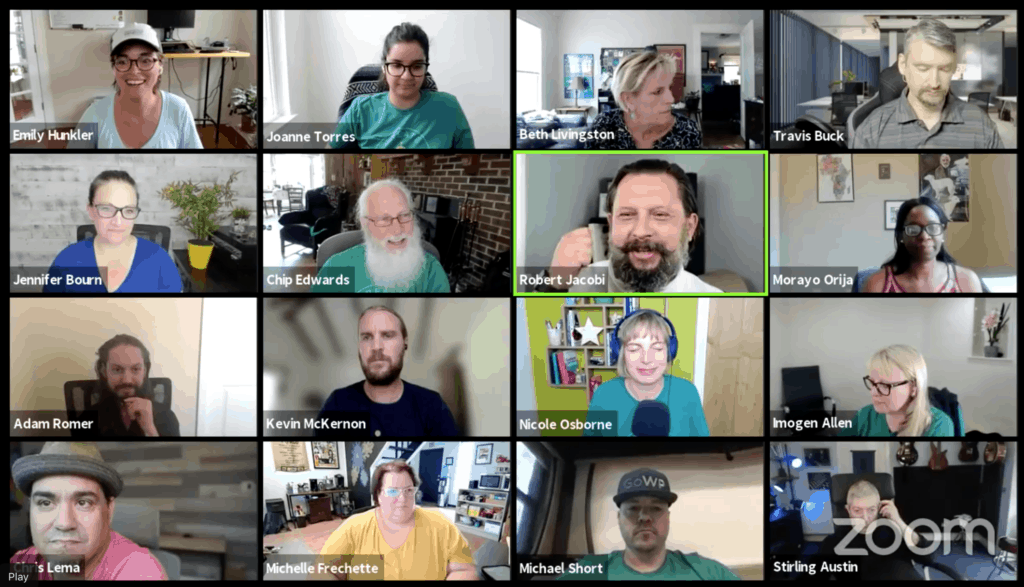
“Leave them wanting more and you know they’ll call you back.” These are the words of the late R&B crooner, Bobby Womack.
Sure. He was referring to the hordes of screaming fans who begged him for an encore. His words, however, can still be insightful for an agency owner or freelancer like you who probably encounters a prospect once a day.
Be prepared for such encounters. Opportunities to speak thoughtfully about your business may occur at any moment. For example:
- Have you ever shared an elevator with a potential client and uttered nothing more than niceties?
- Or, stood shoulder-to-shoulder in a buffet line at a networking event and did little more than complain about the lack of non-meat options?
In this post, we’ll discuss networking, what an elevator pitch is and why they’re essential to the success of your agency. And then we’ll cover 4 different formulas to help you craft the perfect elevator pitch.
Let’s get started!
Make the most of networking opportunities
These brief moments with potential clients are goldmines. Even if the person next to you isn’t your next client, their best friend or colleague might be. So, shrug off these opportunities at your own peril.
This has nothing to do with being pushy or opportunistic. Networking could become a way of life. It can be as simple as how you talk about what you do. And you can employ its best methods at different levels of intensity – whatever the moment calls for.
Even if the idea of networking makes your face sweat or your stomach drop, it is possible to find comfort talking about your business with others.
Imagine yourself as the ideal networker
Actually, imagine the person who isn’t the ideal networker. The person who sweeps through a room to unload as many business cards as humanly possible. Speaking inauthentically with each person she encounters. Or, the guy who religiously speaks much more than he listens to a potential client. That’s not you.
There are tools, like the elevator pitch, you can use to make networking feel more natural and productive. A genuine two-way conversation that aims to highlight a prospect’s problem and what you confidently offer as a solution.
What is an elevator pitch?
The aptly named elevator pitch describes the brief, yet persuasive exchange one has with a captive, prospective client. And, no, it doesn’t need to literally occur in an elevator, but it should take about as long as a ride in one.
Craft a series of elevator pitches for yourself. The common 30-second pitch. The 3-minute pitch that includes a little more detail. And the 30-minute pitch that includes the most detailed layers and engagement with a very interested potential client.
Your elevator pitch is applicable to any situation in which you have a very limited window of time to grab attention and demonstrate how your skills or agency can be of value.
Never make the pitch about you
Potential clients want to know if you have what it takes to help them.
Truth be told and self-affirmations be damned, it’s really not about you at all. A client wants the sense that you understand their typical struggle and can make their life easier.
No matter how kind, funny or respectable you are, it’s never about you.
So, how can you attract clients when you have mere minutes to gain their attention and confidence? Read on to learn “the trick.”
The “trick” is don’t give everything away
When you unload too many details, they’ll tune you out and put up their defenses. Talking too long means you’re probably not listening much and actually decreases your authority because it hints of desperation. And, desperation is never appealing.
Shockingly, Americans experience an estimated 4,000 – 10,000 ads per day. From logos to billboards, digital ads and commercials, marketers have turned us into a seasoned clientele. We recognize a set-up and can certainly sense a pitch coming.
How often do you wave off street promoters who try to hand you a flyer, free sample or their business card. Sometimes, you brusquely might not even acknowledge their existence at all.
But every once in a while, they’ll utter a keyword or flash a sample that does pique your interest. You might stop, turn around and give them a second chance. You likely approach them with questions.
That’s the goal of your elevator pitch – to have an interested audience coming back for more details. The Wommack appeal!
How to talk about your business
What do you say when someone asks, “What do you do?”?
What happens when a lead looks you in the eyes and wants to know more about your services?
Your response shouldn’t be haphazard or wobbly. Hopefully, you’ve given your pitch some thought and practice.
Typically, you’ll have their attention for no more than 30 seconds. In such a limited frame, a prepared formula will serve you well.

Elevator pitch formula #1 -The Transformation
Demonstrate that you create results and transform your clients
The best part about making a cake is eating the cake. When you have a potential client’s ear for just a moment, just give them the cake – the best part of what you do.
Business coach Chris Lema boils this formula down to “I turn A into B by doing C”.
For example, “I turn bloggers into course creators by running them through my 12-week training program.”
Or, “I help digital agencies increase their revenue by providing white label support for their services.”
You’re not giving an exhaustive list of steps, just spotlighting the most engaging elements of your transformative process for clients.
Elevator pitch formula #2 – The Differentiator
Set yourself apart from the competition
Business owner and mentor Jennifer Bourn suggests you grab the listener’s attention then set your skills and experience apart by anticipating their objections and overcoming them.
Use phrases like, “Have you ever struggled with (a)?” And, “Even if you think you don’t have time to do (b), here’s why you should.”
She suggests you communicate who your ideal client is and invite the prospect to action and tell them what to do so they too can benefit from your expertise.
To do this you have to know:
- Who your ideal client is
- What achievement or big result you deliver
- What the benefit of that result is
- What common objections are
- How you’ll invite the prospect to action
Her example is, “I help successful businesses held back by a brand or website reimagine their business so they can enjoy more leads, more opportunities, and more revenue without working more hours — even if they think it’s impossible.
I do that through strategic consulting and personalized done-for-you copywriting and design services. If you are ready to align your brand with your big vision and step into the spotlight, let’s exchange information so we can talk further.”
Read Jennifer’s full formula here. It’s really great!
Elevator pitch formula #3 – The Case Study
Let your clients’ results speak for themselves
This is a favored approach of global strategist Robert Jacobi.
He suggests structuring the conversation as an easy to follow case study that demonstrates your experience in understanding client challenges and how you applied the right solution to get measurable results.
It looks like this: Company X had a problem. Company X tried to solve their problem and failed. Company X met you. You delivered a solution. Company X saw results and is happy and thriving.
If the prospective client wants to go deeper, send them a follow-up email and attach the actual case study.
If you need help crafting a case study of your work, let GoWP help you.
Elevator pitch formula # 4 – The Gatekeeper
Demonstrate that you hold the key
Whether or not a potential client decides to work with you has a little bit to do with how you affect their emotions.
One way to do that is to literally hit them where it hurts.
Remind them of pain points they experience in their business then make them see that you’ve already figured out the solution and are willing to share it with them.
Make your pitch inquisitive.
“Have you ever struggled with x?” Or, “Maybe y is a problem for your agency?” “Well, I help agencies overcome x and sidestep y.”
Be the expert not the generalist
It’s important to speak confidently about your expertise but don’t give away everything in a casual pitch. The potential client is just that – potential. They haven’t retained your services yet and the longer you speak, you risk droning on for too long and losing their focus altogether.
Just answer the question, “What do you do?”, in as balanced a manner as possible.
Don’t share it all, but don’t be general when talking about what you do either. Generalists come a dime a dozen.
Let the potential client dictate the depth of your exchange. With each question they pose they’re inviting you to go deeper.
And you’ll be ready to add more layers to the conversation by going deeper in the results you’ve actually achieved for clients.

Get Feedback
Once you’ve crafted the perfect pitch, you can’t bury it. You have to test it out.
Your peers are perfect sounding boards to practice your pitch. No one wants to hear someone speak on their skills and abilities in a shaky, uncertain way.
You’re selling your professional experience. Practice with yourself or with others to polish your speech.
Ask if you’re hitting the most compelling points. Have others play devil’s advocate and hit you with an unexpected “No” so you can practice your counter.
Join a group like GoWP’s Niche Agency Owner Facebook Group to hear how others craft and deliver their elevator pitch.
Group members generously share tips and experiences that have helped or hindered them in their business.
Find out what Elevator Pitch resources and advice talented mentors like Chris Lema, Jennifer Bourn and Robert Jacobi shared recently with group members.
Watch the replay now
Remember, you want to leave your next prospective client wanting more.





